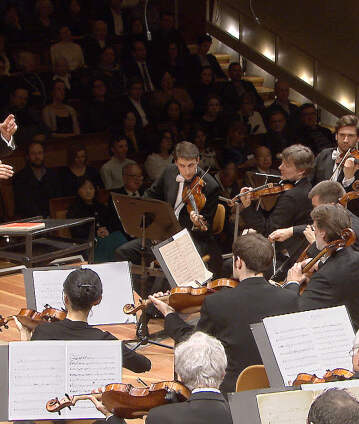Herbert Blomstedt conducts Dvořák and Berwald

Melancholy while powerful, never maudlin: that’s Antonín Dvořák’s Seventh Symphony. The mixture of varied moods is particularly compelling, for instance, in the Scherzo, which is at the same time lugubrious and dance-like. Together with it, Herbert Blomstedt conducts a rediscovery: Franz Berwald’s Third Symphony, a stirring work sometimes reminiscent of Mendelssohn that the Berliner Philharmoniker last performed in 1950.
When you to take a look at Herbert Blomstedt’s current concert schedule, it wouldn’t occur to you that the man is already a veteran of the classical music scene. That’s because the world-class conductor, who was born in the US in 1927 and grew up in Sweden, has a workload that would do credit to a youngster: “Music is of course hard work – as Richard Strauss used to say – but it also gives you strength. If you’re healthy, and you notice you’re still needed, it’s an unstoppable inspiration.”
As a regular guest of the Philharmoniker, Herbert Blomstedt stopped off again in Berlin in the 2015/2016 season – on this occasion with an exciting new repertoire discovery. Blomstedt placed a work by the most important Swedish symphonic composer of the 19th century on the programme: Franz Berwald’s Sinfonie singulière, an opus “largely unknown today – unjustifiably” (Blomstedt). The “uniqueness” referred to in the title of this symphony, Berwald’s Third completed in March 1845, seems already to be confirmed in the work’s first bars. What is unusual here, however, is not the harmonies but rather a curious oscillating of the music, since a simple motif is layered over varying harmonic sequences. After an original second movement, in which the Scherzo is integrated into the middle of the Adagio, there follows a Finale that is impetuous and gives off sparks, whose stirring vitality provides a perfect contrast to what came before.
After Franz Berwald’s Sinfonie singulière, which Herbert Blomstedt also edited in the Critical Complete Edition, there follows Antonín Dvořák’s Seventh Symphony, whom no less a figure than Hans von Bülow, full of admiration, called “the most God-gifted composer of the present day next to Brahms”. At the London premiere the work “had an exceptionally brilliant success” (Dvořák); even the recalcitrant critic George Bernard Shaw praised “the variety of rhythm and figure”.
© 2016 Berlin Phil Media GmbH
Related interviews
Artists
Our recommendations
- Herbert Blomstedt conducts Bruckner’s Sixth Symphony
- Herbert Blomstedt conducts Bruckner’s Fifth Symphony
- Bartók and Brahms with Herbert Blomstedt and András Schiff
- Herbert Blomstedt and Maria João Pires
- Herbert Blomstedt conducts Beethoven and Nielsen
- Herbert Blomstedt conducts Beethoven’s “Missa solemnis”